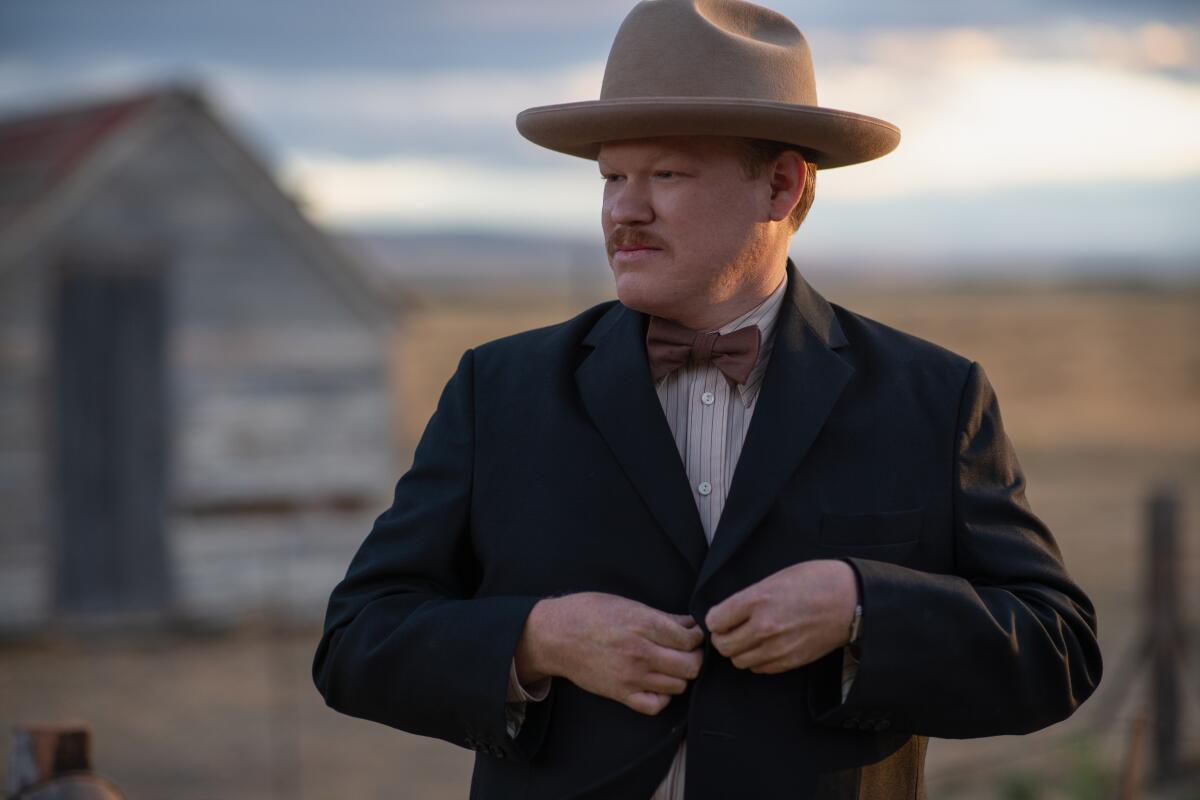Why Jesse Plemons responds to those inner struggles for expression

- Share via
When Jesse Plemons first met with Jane Campion about playing soft-spoken, duty-bound, and forward-thinking Montana rancher George Burbank — the opposite of his hot-headed cowboy brother Phil — the “The Power of the Dog” filmmaker made a cultural connection that clicked for the Texas-born actor. “She referenced Robert Duvall in ‘The Godfather,’ which I thought was so interesting,” says Plemons.
“[George] does have this quiet strength. There’s a real dignity to him. But he’s not on the inside [of Phil’s world], and he never will be.” Plemons, of course, not only memorably took on George, but it granted him access to his own rarefied inner circle — that of the Oscar-nominated, which also now includes his life partner and “Power” co-star Kirsten Dunst, nominated for playing George’s wife, Rose.
What happened on nomination day?
I’ve been shooting this mini-series here in Austin, and with all the build-up, I had a good feeling there were going to be nominations [for “Power”], but I was just thinking about Kirsten. Then she called me right before I went into rehearse a pretty intense interrogation scene and told me I had also been nominated. Then I went and commenced to being interrogated for, like, three hours.
And perhaps trying to suppress a smile?
Well, the scene was with actor Brad Leland, who played Buddy Garrity on “Friday Night Lights,” and who I’ve known for 15 years.
Oh wow, how poetic to be with someone from the show that launched your career on the day you hit this acting milestone.
And it’s the first time we’ve worked together since, so I kept thinking, “Oh, my God, I can’t suck on the day I find out I was nominated!” So I didn’t tell anyone. But then the production found out, and Brad was just so stunned and proud. He kept saying, “I don’t think I can do this! Like, stop being happy!” Then I got to spend the second half of the day with Kirsten and the family.
Why does Kirsten deserve the Oscar?
I don’t think there’s an actress out there that reaches as deep as she does. When she tries to play the piano, and there’s that shot of her hands, and she turns around, and the line is “I’m sorry I can’t” … it’s just so loaded with everything that woman is experiencing. It’s just her operating from her heart and soul and guts. That’s why she’s so incredible.
Well, your underplaying has become a high watermark in the profession. What’s appealing to you about those types of portrayals?
Maybe it’s where I grew up, my experience with people. There are definitely people who let you know everything that’s going on, in a wild way. But I find that people are more complex and complicated than that. “Friday Night Lights” was such an incredible lesson in taking ownership of your character. Everyone is struggling to express themselves. It’s easy for some, but a lot of people, it takes some effort to get there, and there’s so much happening beyond what’s written. Those are the types of performances I respond to.
In “Power,” that meant conveying a whole life with Benedict Cumberbatch’s Phil.
We knew that would be the biggest challenge. They were so entwined. So it really helped that we had this two-, three-week rehearsal period before we started shooting, which is so rare. I’ve never had that opportunity, where you can play, experiment, make mistakes. Jane was really involved in each character. She played our mother in rehearsal too, and played her brilliantly. Like, eerily good.
That sounds so wonderfully intensive.
I know a lot of actors who didn’t come from the stage have this feeling that if you over-rehearse something, you lose something spontaneous. But Jane was adamant that it was the reverse, that the more you dig, rehearse and get into something, the more freeing the experience will be. And I did find it extremely helpful. I mean, you never get to do things like improvise a scenario where you’re playing a 15-year-old version of your character when your brother’s going off to school. But I needed to find the love and codependence that was there in this odd, specific relationship.
Did Benedict’s not showering also do its part to help you get into character?
You know, I grew up on 36 acres with horses and cattle. My sister and I were in the Youth Rodeo Assn., my dad’s side of the family still rides and ropes. So maybe my olfactory senses are used to that sort of thing!
How did your cowboy background factor into choosing to play George?
It’s a pretty significant part of me. I mentioned to Jane this book Larry McMurtry wrote, a collection of essays about Texas in the ‘60s, the mythology and mystique of the American cowboy, the pull away from tiny towns toward huge cities, and the fact that [cowboys] are becoming obsolete. That’s definitely happening in “The Power of the Dog.” So it’s interesting, because of my upbringing, to play the side of the coin that’s excited about the future. Like it or not, I have that same attraction to it, you know?
More to Read
Sign up for The Envelope
Get exclusive awards season news, in-depth interviews and columnist Glenn Whipp’s must-read analysis straight to your inbox.
You may occasionally receive promotional content from the Los Angeles Times.






